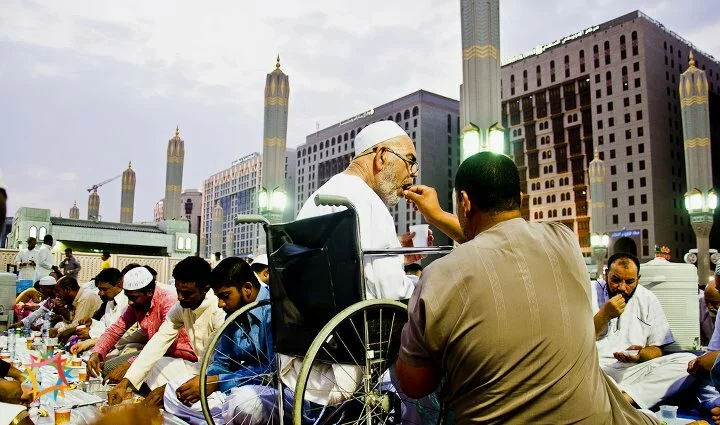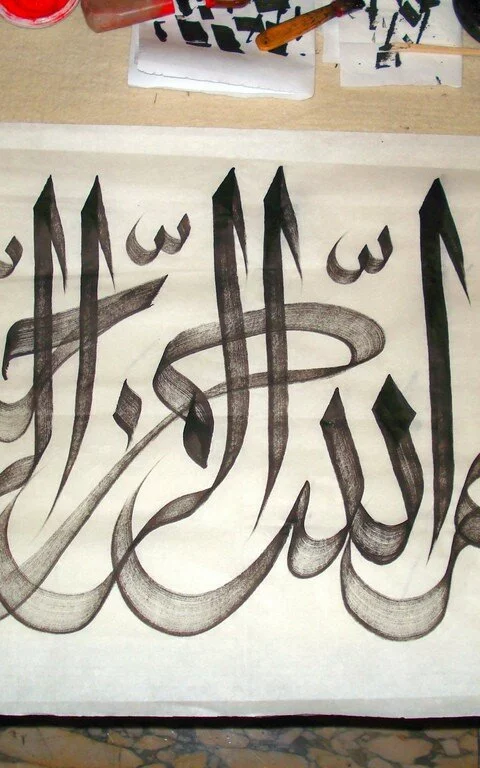Afrina Khan with her spicy beef curry. The Bangladeshi community take it in turns to cook for the communal dinner
Traditional Jalebi is a fried sweet treat eaten for Iftar
Preparing Iftar – the meal that breaks the fast
Bangladeshi women prepare the Iftar meal
Traditional Bangladeshi food is prepared to break the fast
Lebanese bread is donated for the feast in Murdoch
The Maghrib prayer, the fourth prayer of the day, is prayed at sunset just before breaking the fast
Traditional Bangladeshi Iftar consists of fruit, cake, jalebi, dates and a spicy chickpea dish
Children, the elderly and mentally impaired are not required to fast for Ramadan
Boxes of Iftar to break the day-long fast
Women gather in a separate area to the men as is tradition for prayer.
Khurshida Islam is the Deputy Principal of Curriculum at the Australian Islamic College in Kewdale
After prayer and Iftar, a feast of Bangladeshi food; such as curries, rice and salads, is shared.
It is narrated from Sahl bin Sad (radiyAllaahu anhu): Allah’s Apostle (salallaahu ‘alaihi wa salam) said: “The people will remain on the right path as long as they hasten the breaking of the fast.” [Bukhari: Book 3 Vol 31 #178; Muslim: Book 6 #2417]
It is narrated from Abu Hurayrah (radiyAllaahu anhu) that The Prophet (salallaahu ‘alaihi wa salam) said: “Religion will continue to prevail as long as people hasten to break the fast, because the Jews and the Christians delay doing so.” [Dawud: Book 13 #2346]
Abu ‘Atiyya (radiyAllaahu anhu) reported: I and Misruq went to ‘A’isha (radiyAllaahu anha) and Masruq said to her: “There are two persons among the Companions of Muhammad (may peace be upon him) none of whom abandons the good, but one of them hastens to observe sunset prayer and break the fast, and the other delays in observing the sunset prayer and in breaking the fast”, whereupon she said: “Who hastens to observe sunset prayer and break the fast?” He said: “It is ‘Abdullah.” Upon this she said: “This is how the Messenger of Allah (may peace be upon him) used to do.” [Muslim: Book 6 #2419, 2420]
Saying the Pious Predecessors:
Sa’id b. Al-Musayyib reports from his father, “I was once sitting with ‘Umar when a group of people arrived from Al-Sham. ‘Umar enquired about them and how they were; he asked, ‘Do the people of Al-Sham hasten to break the fast.’ He said, ‘Yes.’ [‘Umar] said, ‘They will not cease to remain upon good as long as they do this, and do not wait for the stars [to come out] as the people of Iraq do.’” [‘Abd Al-Razzaq Al-San’ani, Al-Musannaf 4:225.]
‘Amr b. Maymun Al-Awdi reports, “The Companions of Muhammad – Allah’s peace and blessings be upon him – used to be the quickest to break the fast and the slowest in taking the pre-dawn meal.” [Ibid. p226.]
Ibn Al-Musayyib also reports that ‘Umar wrote to the commanders of the various regions, ‘Do not be of the procrastinators when breaking the fast, and nor of those who wait for the stars before they start praying [al-maghrib].’ [Ibid. p225.]
Musa b. Anas reports that Anas [ibn Malik] used to have his slave-girl go to the top of his house, instructing her, ‘When the horizon becomes even (evenly lit, marking sunset), tell me.’ [Ibn Abi Shaybah, Al-Musannaf 2:430.]
Abu Al-Tiyah Al-Daba’i reports that “he used to break fast with Ibn ‘Abbas during Ramadan. When evening approached he would send a girl from his household to the roof [to look out], and when the sun set he would make the call to prayer (adhan). He would eat with us, and when he had finished, the call for the commencement of prayer (iqamah) would be given, and he would pray, and we would pray with him.” [Ibid. p429.]
Source: navedz.wordpress.com
It is mustahabb in Ramadan to offer Iftar to those who are fasting, because of the hadith of Zayd ibn Khaalid al-Juhani (may Allaah be pleased with him) who said:
The Messenger of Allah (peace and blessings of Allah be upon him) said: “Whoever gives Iftar to one who is fasting will have a reward like his, without that detracting from the fasting person’s reward in the slightest.”
[Narrated by al-Tirmidhi, 807; Ibn Maajah, 1746; classed as saheeh by al-Albaani in Saheeh al-Tirmidhi, 647.]
Question
What are the virtues of completing the Qur`an more than once during Ramadan?
Answer
By: `Ali Jum`ah
Wa `alaykum as-Salamu wa rahmatullahi wa barakatuh.
In the Name of Allah, Most Gracious, Most Merciful.
All praise and thanks are due to Allah, and peace and blessings be upon His Messenger.
Dear brother, thank you for your question that shows your interest in Islam and your zeal in reciting the Qur’an.
`Abdullah ibn Mas`ud (may Allah be pleased with him) narrated that he heard the Prophet (peace be upon him) saying, “The one who recites a letter from Allah’s Book (i.e. the Qur’an), would receive a reward (hasanah), and the hasanah is multiplied to ten likes. I don’t say ALM (alif lam meem) is a letter, but A (alif) is a letter, L (lam) is a letter, and M (meem) is a letter.” (At-Tirmidhi)
Responding to your question, Dr. `Ali Gom`ah, the Grand Mufti of Egypt, stated, (more…)



